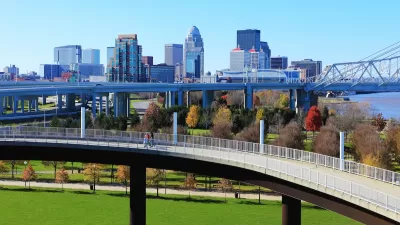Louisville will be the testing ground for an initiative that seeks to develop technologies to increase the engagement between low-income city residents and their local governments.
Arthur Burris, Director of Policy and Special Initiatives with Living Cities, describes a technology initiative being developed by OpenPlans to engage a broad cross-section of Louisville residents, including low-income millennials, in the creation of a 25-year vision plan for the city.
"We believe that the issue of planning is particularly ripe for civic tech innovation, as the growing number of civic apps in this space attests," explains Burris. "Furthermore, city plans can attract public attention and, potentially, form the basis for more sustained interaction between cities and city residents."
"In practice, unfortunately, cities often struggle to engage productively and systematically with their low-income residents around these plans. Many traditional mechanisms for engagement around planning (e.g., planning meetings) tend to reach small numbers of people who are not representative of low-income communities as a whole. Despite the recent growth of civic apps focused on planning, we’re still far from having a full set of tech tools that supports engagement in a truly systematic way."
The "tech solution" being developed for this project is meant to be “portable” to other cities. We'll keep you updated as to what they come up with.
FULL STORY: Using Civic Tech to Increase the Engagement of Low-Income Communities

Study: Maui’s Plan to Convert Vacation Rentals to Long-Term Housing Could Cause Nearly $1 Billion Economic Loss
The plan would reduce visitor accommodation by 25,% resulting in 1,900 jobs lost.

North Texas Transit Leaders Tout Benefits of TOD for Growing Region
At a summit focused on transit-oriented development, policymakers discussed how North Texas’ expanded light rail system can serve as a tool for economic growth.

Why Should We Subsidize Public Transportation?
Many public transit agencies face financial stress due to rising costs, declining fare revenue, and declining subsidies. Transit advocates must provide a strong business case for increasing public transit funding.

How to Make US Trains Faster
Changes to boarding platforms and a switch to electric trains could improve U.S. passenger rail service without the added cost of high-speed rail.

Columbia’s Revitalized ‘Loop’ Is a Hub for Local Entrepreneurs
A focus on small businesses is helping a commercial corridor in Columbia, Missouri thrive.

Invasive Insect Threatens Minnesota’s Ash Forests
The Emerald Ash Borer is a rapidly spreading invasive pest threatening Minnesota’s ash trees, and homeowners are encouraged to plant diverse replacement species, avoid moving ash firewood, and monitor for signs of infestation.
Urban Design for Planners 1: Software Tools
This six-course series explores essential urban design concepts using open source software and equips planners with the tools they need to participate fully in the urban design process.
Planning for Universal Design
Learn the tools for implementing Universal Design in planning regulations.
Ascent Environmental
Borough of Carlisle
Institute for Housing and Urban Development Studies (IHS)
City of Grandview
Harvard GSD Executive Education
Toledo-Lucas County Plan Commissions
Salt Lake City
NYU Wagner Graduate School of Public Service





























